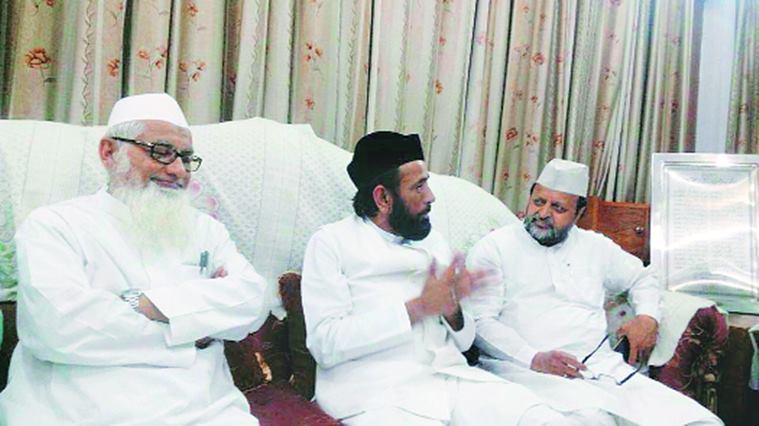Some Known Details About Barelvi
Wiki Article
Unknown Facts About Barelvi
Table of ContentsUnknown Facts About BarelviThe Barelvi IdeasExcitement About BarelviThe Basic Principles Of Barelvi
Radical Islamist teams in South Asia such as the Taliban are usually categorized as Wahhabis, belonging to the ascetic, puritanical kind of Islam institutionalized in Saudi Arabia. However while the connections in between the Wahhabis as well as the Taliban are limited, the last in fact come from a various branch of the belief.Sunni Islam is divided into four orthodox institutions of regulation (Madhhabs), each of which is followed in distinct components of the Muslim globe. A variety of rites and prayer types likewise vary amongst the colleges. As the map over shows, Wahhabism, based in Saudi Arabia, is related to Hanbali regulation, the strictest form of Islamic law.
" Sunni Muslims," Haqqani writes, have cast apart their aversion to Wahhabi groups, producing a multitude of standard Sunnis that embrace Wahhabi political and also jihadi ideas without necessarily surrendering their ceremonies and rituals." As is frequently kept in mind, Saudi Arabian spiritual financing has assisted damage down the barriers between both sects.
The smart Trick of Barelvi That Nobody is Discussing
Mapping the 4 conventional institutions of Sunni Islamic legislation is fairly simple, although the writers of the Wikipdia map posted above should have recommendation for doing a specifically excellent job. But the differences that really matter are not those of Madhhab, but rather are discovered among less formal and a lot more current "activities" within Islamic idea and also practice.The Deobandi motion is lined up with Wahhabism as well as developments a similarly extreme, puritanical interpretation of Islam. The Barelvi movement, on the other hand, safeguards a much more standard South Oriental version of the belief fixated the practices of Sufi mysticism. In India and also specifically Pakistan, tensions between the 2 groups can be extreme, occasionally verging on open war.
As just recently reported in the, "When the Taliban took over Buner in April 2009, they initially besieged Pir Baba's shrine. Taliban leader Fateh Khan said it was due to the fact that the place was a center of 'infidelity and idolatry.'" Because of this, lots of Sufi shrines are currently heavily secured by Pakistani protection forces.
One can, however, conveniently portray their area of origin, as both motions are named for communities in northern India: Deoband as well as Bareilli. Although radical Deobandi teams are most very closely connected with Pakistan and Afghanistan, the motion's intellectual and also spiritual heart is still the Indian city of Deoband. Its Darul Uloom Deoband is deemed to be the 2nd biggest madrasah (religious school) in the Sunni Muslim world, complying with only Al-Ahzar in Cairo.
Rumored Buzz on Barelvi
Solid numbers are difficult to find, most experts maintain that Barelvis considerably out-number Deobandis not simply among Indian Muslims however in Pakistan. In Pakistan, nevertheless, Deobandis have actually been progressing of late, and Barelvis retreating. According to one estimate, "some 15 percent of Pakistan's Sunni Muslims would certainly consider themselves Deobandi, and also some 60 percent are in the Barelvi practice.Early find more Deobandi leaders were troubled by the accomplishment of British manifest destiny as well as English-language education, which they sought to battle by purifying their faith, removing away magical practices and various other advancements that they considered as as opposed to the faith (Barelvi). One of the most hardline Deobandis came to regard Barelvis, as well as Shiites, as non-Muslim opponents deserving of assault.
Deobandi reasoning is also standard to be patriotic, regarding the community of the faithful, not the modern nation-state, as the appropriate Quranic political vehicle. Many Deobandi scholars denied the partition of British India in 1947, preferring to look for the spread of Islam in an undistracted India. The suggestion of Pakistan, in addition, was originally embraced by Muslim teams abhored by the hardline Deobandis (Barelvi).
In time, nonetheless, received Sunni Islam came to control Pakistan. President Muhammad Zia-ul-Haq (1978-1988) functioned difficult to turn Pakistan into a fundamentalist Sunni state, officially stating the heterodox Ahmadis to be non-Muslims. As a result, the Pakistani federal government increasingly veered towards the severe Deobandi motion. The connection, however, is a two-edged sword for modern Pakistan, as the Deobandi faithful eventually have ridicule for national identities and also borders.
5 Simple Techniques For Barelvi
Doubters connect it to terrorist organizations; the Taliban, after all, uprised of Deobandi madrasahs in northeastern Pakistan, as did several other violence-prone organizations. Horrendous fatwas (religious judgments) do not aid its reputation. In May 2010, a mandate that ladies can not benefit official statement incomes surprised mainstream Muslim opinion worldwide. (The referred to it as a "Talibanesque fatwa that stank of tribal patriarchy.") Much more awkward was the 2006 "fatwas for money" bribery scandal, which was revealed by an Indian tv sting operation.

As Abedin writes: On the concern of supposed Wahabism I place it to Madrassi that numerous doubters of the Deoband seminary claim that Deobandi beliefs are simply a tiny step away from full-blown Wahabism. In response the replacement Vice Chancellor makes a clear separation in between the two institutions of idea, before adding that if we consider the Wahabis and also the Barelvis as 2 extremes, the Deobandis occupy the centre ground in that continuum.
Report this wiki page